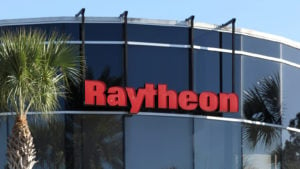The aerospace industry plays a pivotal role in shaping modern transportation, defense systems and scientific exploration. Driven by a demand for innovation, engineers are more inclined than ever to explore beyond Earth.
The defense and aerospace industry was valued at $795.92 billion in 2022 and is forecasted to grow to $1076.56 billion by 2027. The industry’s explosive growth is fueled by global travel needs, space exploration, military-political issues and more.
North America holds over a 38.7% market share in this ever evolving global industry. The Biden administration aims to further boost space-related expenditures by 8% in FY 2023 alone. These investments have spurred innovation and resulted in 145 reported orbital launches in 2021, a 27% increase year-over-year (YOY). The best space stocks to buy will continue to grow along with market momentum.
Boeing Company (BA)
![Royal Air Force Boeing (BA) Chinook HC2A (352) [ZH895] lifting off from runway](https://investorplace.com/wp-content/uploads/2022/03/boeing_ba_ch47_1600-300x169.png)
Boeing Company (NYSE:BA) is a manufacturer of commercial jets, satellites and more. BA stock is up 21.83% year-to-date, with 22 analysts predicting a median forecasted price of $257.5 and a high price of $310, equivalent to an 11.3% to 24% upside over the next 12 months.
Boeing has been performing extremely well with a 3-year revenue CAGR of 18.71% to a 2022 revenue of $66.61 billion. The company also has a levered FCF margin of 12.69% a percent difference of 148.51% from the sector median. Boeing can attribute this growth to its continued development of relevant technology.
Boeing’s growth is fueled by a 20-year delivery forecast of 42,595 airplanes and a $2.02 billion U.S. Navy contract for system upgrades. Additionally, with travel rebounding to 88% of pre-COVID-19 levels, Boeing is poised to benefit from increased commercial plane orders.
Investors should keep BA on their watchlists due to its strong financial performance, favorable industry trends and profitable deals.
L3Harris (LHX)

L3Harris (NYSE:LHX) is an American-based defense contractor that manufactures technology for sea, space and air applications. The world-recognized aerospace corporation stands out among competitors as it is a conglomerate of various business segments, each responsible for a unique domain/solution.
Admittedly, LHX stock has not had the most ideal year, dropping 9.81% YTD. Despite this, its latest quarter’s earnings results are strong, with its revenue of $4.69 billion growing 13.49% YoY and beating estimates by $318.88 million. Its normalized EPS of $2.97 additionally beat projections by $0.02–a 3.8% increase from the previous quarter. Further, Yahoo! Finance reports 17 analysts having an average 1-year price range of $234.47, with the range being from $162 to $338.
Earnings aside, L3Harris is part of a rapidly expanding industry poised for exponential growth. The aerospace market, projected to grow $170.49 billion more by 2026, is bigger than it has ever been before as deep space exploration and commercial space flights hold an increasing presence in our society. That said, the company has recently acquired Aerojet Rocketdyne, a leading aerospace company that manufactures propulsion technology. This acquisition makes L3Harris the prime contractor of the powerful RS-25 engines for NASA’s upcoming Artemis III mission — acting as a tailwind for LHX stock in the foreseeable future considering the massive publicity and prestige collaborating with NASA brings.
Ultimately, despite LHX stock dropping over 9% YTD, it presents solid financials, and its new acquisition and upcoming partnership with NASA will allow it to, much like the rockets it manufactures, take off.
Raytheon Technologies Corporation (RTX)

Raytheon Technologies Corporation (NYSE:RTX) is a multinational aerospace and defense company that provides products and services in the commercial, military and governmental sectors.
The aerospace market is expected to grow from $430.9 billion in 2025 to $572.6 billion in 2030 at a CAGR of 5.9%. Value Line (NASDAQ:VALU) studied that Raytheon could generate $64 to 65 billion in sales this year. Meanwhile, it predicted $74.7 billion in sales for Boeing and around $67 billion for Lockheed Martin (NYSE:LMT).
Raytheon has enormous growth potential as the exclusive provider of engines for a couple of the most important military aircraft. Recently, the company’s BBN division partnered with SpiderOak to provide security systems for satellite communications in proliferated Low-Earth Orbit (pLEO). These solutions will also provide even more convenience for global consumers.
Raytheon Technologies is poised for growth in the next few years, having laid the groundwork for success. Yahoo! Finance reports 21 analysts having a mean 12-month price target of $91.48.
On the date of publication, Michael Que did not have (either directly or indirectly) any positions in the securities mentioned in this article. The opinions expressed in this article are those of the writer, subject to the InvestorPlace.com Publishing Guidelines.
